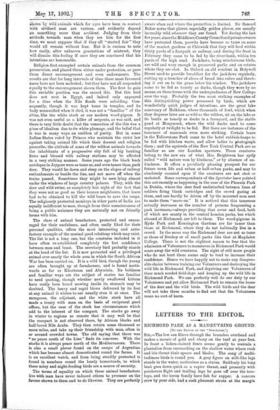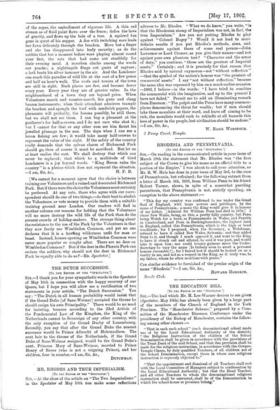LETTERS TO THE EDITOR.
RICHMOND PARK AS A MANCEUVRING GROUND.
[To THE EDITOR OP THE " SPECTATOE."1 Sin,—The low sun filters through the branches overhead and makes a mosaic of gold and ebony on the turf at your feet, In front a lichen-stained fence seems gently to restrain a plantation from encroaching on the shallow water where rush and iris thrust their spears and blades. The song of multi- tudinous birds is round you. A grey figure on stilt-like legs stands in the water, motionless as a statue. Suddenly his long beak goes down quick as a rapier thrust, and presently with ponderous flight and trailing legs he goes - off over the tree- tops, and the heron family have fish for supper. A raucous crow by your side, and a cock pheasant struts at the margin of the copse, the embodiment of vigorous life. A thin red stream as of fluid paint flows over the fence; defies the laws of gravity, and flows up the bole of a tree. A squirrel has gone in quest of his supper. A doe with twitching ears leads her fawn delicately through the bracken. Move but a finger and she has disappeared into leafy security ; as do the rabbits that but a moment before were playing almost round your feet, the rats that had come out stealthily for their evening meal. A moorhen clucks among the weeds out yonder; a nightingale flings out gusts of rapture ; a lark beats his silver hammer in the air. And the Londoner can reach this paradise of wild life at the cost of a few pence and half an hour's walk. The roofs and towers of the town are still in sight. Such places are few, and become fewer every year. Every year they are of greater value. In the neighbourhood of a town they are beyond price. When Volunteers march and counter-march, fire guns and clang brazen instruments; when their attendant admirers trample the bracken and spangle the turf with sandwich papers, the pheasants will probably, the herons possibly, be still there, but we shall not see them. I can buy a pheasant at the poulterer's for half-a-crown, and I do not care who shot it; but I cannot for that or any other sum see him flaunt his jewelled plumage in the sun. The days when I can see a heron fishing are few ; it would take many half-crowns to represent the value of the sight. If the safety of the country really demands that the sylvan charm of Richmond Park should go, then of course it must be sacrificed. But let us at least realise the cost. We shall destroy that which can never be replaced; that which to a multitude of tired Londoners is a joy beyond words. " King Heron rules the country" is a phrase which does not represent the situation.
[We cannot for a moment agree that the choice is between training our Volunteers and a ruined and desecrated Richmond Park. But if there were the choice the Volunteers must certainly be preferred. At any rate, those who agree with our corre- spondent should do one of two things,—do their best to abolish the Volunteers, or vote money to provide them with a suitable training ground near London. Our readers will find in another column our reasons for holding that the Volunteers will no more destroy the wild life of the Park than do the present crowds of holiday-makers. The strange thing about the resistance to the use of the Park by the Volunteers is that they now freely use Wimbledon Common, and yet no one declares that it is a howling wilderness unfit for man or beast. Instead, houses opening on Wimbledon Common were never more popular or sought after. There are no deer on Wimbledon Common ? But if the deer in the Phcenix Park can endure the soldiers, why should not the deer in Richmond Park be equally able to do so P—En. Spectator.]







































 Previous page
Previous page